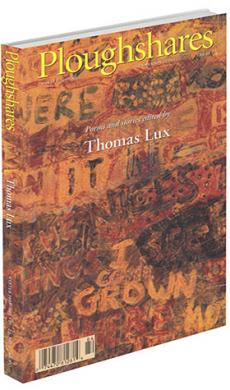rev. of Fuel by Naomi Shihab Nye
Fuel
Poems by Naomi Shihab Nye. BOA Editions, $12.50 paper. Reviewed by Victoria Clausi.
The poems in Naomi Shihab Nye’s latest book,
Fuel, comprise a world filled with intelligence, warmth, humor, and tenderness. It is a world wherein the ordinary becomes extraordinary and the lived moment links itself to history. It is a world in which the poet works with as much generosity in uniting the Arab and the Christian worlds as she does in bringing together a mother and her son for an evening at the ballet, or a classroom of pupils and their teacher, or a variety of lost pets and their owners, or a divorced friend and the “almost blooming” lying “dormant” within her.
Nye’s best poems often act as conduits between opposing or distant forces. Yet these are not didactic poems that lead to forced epiphanic moments. Rather, the carefully crafted connections offer bridges on which readers might find their own stable footing, enabling them to peek over the railings at the lush scenery.
With clear images and striking metaphors,
Fuel confirms Nye’s belief in the value of the overlooked, the half-forgotten, “the little sucked-in breath of air / hiding everywhere.” Like the late William Stafford, to whom Nye dedicates the second poem in this volume, “Bill’s Beans,” she cannot help loving small hidden wonders of the natural world. “Under the leaves, they’re long and curling. / I pull a perfect question mark and two lean twins, / feeling the magnetic snap of stem, the ripened weight.”
But Nye’s Palestinian-American heritage, reflected in several of the strongest poems in
Fuel, leads her to take up more worldly concerns as well. She never rails, though. Her poetics require a calmer language, her implicit claim being that a writer’s impact increases when she becomes quieter, more contemplative. In “The Palestinians Have Given Up Parties,” her distress about the devastated region where “once singing would rise / in sweet sirens over the hills” bears less anger than sorrow, less admonishment than prayer. In this poem, as in many others,Nye resolutely seeks to tell “the story behind the story.” For Nye, the power of the lesson lies beyond headlines — the heartbreaking truth that “bombs break everyone’s / sentences in half” and “soldiers come at night / to pluck the olive tree from its cool sleep.” Nye insists her readers see more, that they feel, smell, and hear softer, smaller, quieter, and so, paradoxically, more powerful images: “No one hears the tiny sobbing / of the velvet in the drawer.”
To know the poems of
Fuel is to hear that “tiny sobbing”; it is to see “grasses in their lanky goldenness”; it is to smell the fundamentalism of “villagers carrying baskets of lemons”; it is to learn, again, the way we learned as children, how to “open, / when we are so full.” One comes from this collection enlivened by the wisdom Nye finds in a range of subjects, spanning from the larger themes of war to the extraordinary “thanks” she gives “to the small toad that lives in cool mud at the base of the zinnias.”
Victoria Clausi’s poetry has appeared in The Squaw Review, Poetry Motel,
and Visions International.
She teaches poetry and writing at O’More College in Franklin, Tennessee, and in Bennington College’s July Program.

